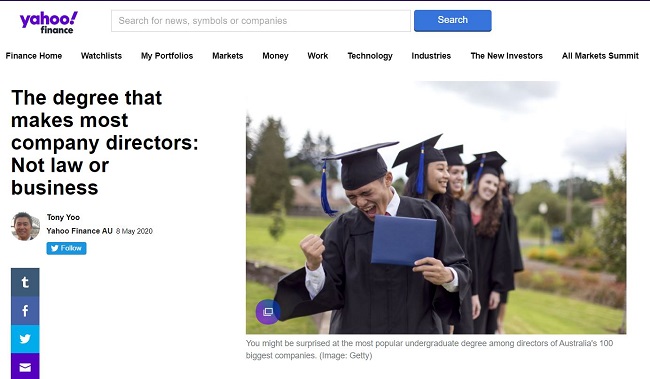by Amelia Stubley
September 12, 2019
Corporate Communications
Why are we still not seeing an even representation of women in power roles?
The Apollo Communications Top 50 CEO report proves that we have a shortage of woman leading our largest and most powerful companies. That means if your organisation wants to stay relevant and boost its reputation, you need you show you are making the effort to help more women get a seat at the table.
When I was in my final year of high school, we had an assembly to talk about gender equality and what it meant for us as young women.
Going to a “prestigious all-girls school on Sydney’s North Shore”, we were encouraged to strive to achieve good marks to get into a decent university and, in turn, have a prosperous career.
We were shown a Ted Talk by Facebook’s Chief Operating Officer Sheryl Sandberg, titled ‘Why we have too few women leaders.’ Six years out of high school, this Ted Talk still sticks with me and unfortunately, whilst I enjoyed it, it remains relevant today.
Despite Australia’s corporate leaders reportedly recognising that gender equality is now essential for business success, it has not yet been achieved and appears to be a long way off – even with public demand.
Apollo Communications’ 2019 Top 50 CEO Report shows that only three of our top 50 CEOs are women. So why is it taking so long and how many times do we have to repeat ourselves to finally achieve it?
What is gender equality?
Before I delve deeper into why empowering women is becoming more and more crucial for organisations, it’s important to understand what gender equality actually means.
The Google Dictionary definition for gender equality is ‘the state in which access to rights or opportunities is unaffected by gender.’ This is relevant to all sectors of society, including economic participation and decision-making, as well as the behaviours, aspirations and needs of women and men being valued and favoured equally. If this is what contemporary corporations are aiming to achieve, why do women only account for 30 per cent of board positions (across Australia’s top 100 listed companies) and 6 per cent of Australia’s top 50 CEOs (CEO report)?
Why is this still an issue and what can we do about it?
Sheryl Sandberg attributes the lack of women leaders to a number of things, such as:
- Of the senior managers in a US study surveyed, two-thirds of married men had children and only one-third of married women had children.
- A lack of mentoring programs for women to encourage their professional development.
One big issue discussed, however, is that women face harder choices between professional success and personal fulfilment. This is proven, according to Sandberg, through the number of women dropping out of the workforce for personal reasons – such as wanting to raise a family. There’s also the issue of women attributing their successes to external factors, whereas men, typically, attribute theirs to internal ones.
A recent article by Beth Gaze in the Sydney Morning Herald explores these same issues, discussing how women are expected to be “relationship-orientated, caring and altruistic in acting for the good of others rather than their own self-interest.” In contrast, men are expected and permitted to be individualistic, active and competitive and to act self-interestedly.
As a result of this, Gaze explores how assertive women leaders may be condemned as bossy and aggressive, whereas leaders who are empathetic, collaborative and co-operative may be considered weak because they don’t match up to societal expectations of leadership. These examples only scrape the surface of why we still aren’t seeing more women in power roles.
As an employer, you can actively foster women by enabling flexitime and mentoring programs to encourage their professional growth. As a woman, you can stop systematically underestimating your achievements, start negotiating for yourself in the work force and, ultimately, own your own success.
Why is gender equality important?
Even though more than 70 per cent of adult Australians think gender is irrelevant when it comes to being a good CEO, a mere three of Australia’s Top 50 CEOs are women, proving there is still a long way to go before gender equality is obtained at the highest corporate levels (CEO report). The three trailblazers bucking the overall trend are Elizabeth Gaines (Fortescue) , Susan Lloyd-Hurwitz (Mirvac Group) and Shemara Wikramanayake (Macquarie Group) – go girls!
Australia is ahead of the United States, however, where just 24 (4.8 percent) of Fortune 500 CEOs are women. Regardless, there is no denying we could be doing better.
Former Australian Institute of Company Directors (AICD) chairman Elizabeth Proust brilliantly highlights the importance of achieving equality for Australians:
“Diversity of thought, experiences, background, ethnicity and – yes – gender. This is fundamental to safe-guarding against group-think, enhancing decision-making and ultimately driving better governance in this country.”
By empowering women more, Australian organisations will not only be embodying the beliefs of the public, but safeguarding their reputation to carry them successfully into the future – a win-win right?
Whether the underrepresentation of women in power roles continues to be the trend long-term is yet to be seen, with many organisations now (finally) insisting on gender parity at both the Board and Executive levels, and shareholders being open to the concept of female leaders on the same terms as their male peers.
Australians recognise the boundless benefits of true gender equality, so let’s try harder to speed-up the process, start empowering women more, and set the benchmark for corporations worldwide by recognising there’s still a problem and that we need a collective will to foster change.
And to all the women reading this – take the advice of powerful female role models in our society, sit at that table, and own your success.
Find out more
If you want to add to the conversion or have some stories to share about gender equality in the workplace, please contact Amelia Stubley at Apollo Communications.
NEWS AND MEDIA

Freedom is anchored to a free press
Yesterda...
Measure and manage your Corporate Reputation

Suite 94 | Jones Bay Wharf
26-32 Pirrama Road
Pyrmont NSW Australia 2009



